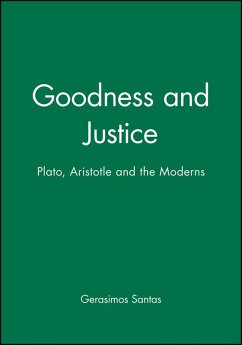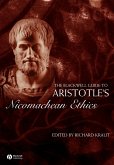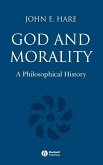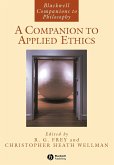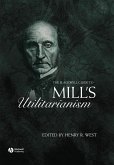This volume explores Plato's and Aristotle's theories about good things, goodness, and the best life for human beings, and draws comparisons between ancient and modern theories of good and justice. Goodness and Justice argues that goodness was the most fundamental normative concept in the ethics of Plato and Aristotle, and illustrates how they used their functional and formal theories of good to build their theories of virtue, justice, and happiness. It also shows that they fought subjective theories of good as desire satisfaction and good as pleasure, in favor of what they thought was a more objective concept of good found in form and function. The comparisons with the moderns illuminate the merits and limits of ancient and modern ethical theories and place them within a broad philosophical and historical context.
Hinweis: Dieser Artikel kann nur an eine deutsche Lieferadresse ausgeliefert werden.
Hinweis: Dieser Artikel kann nur an eine deutsche Lieferadresse ausgeliefert werden.
"Santas's book is a major contribution to the study of ancientGreek ethics. His discussion of the theoretical structure ofPlatonic and Aristotelian ethics and the comparisons he drawsbetween the ethical views of the ancient Greek philosophers andthose of the moderns, especially of John Rawls, have no equal inthe existing literature. This is essential reading for anyoneinterested in Greek ethics or ethical theory in general."
Georgios Anagnostopoulos, University of California at SanDiego
"One of the very greatest Socrates scholars of the twentiethcentury - here in finer form than ever - now brings usthe fruits of decades of reading and teaching the ethics and socialphilosophy of Plato and Aristotle viewed in the light of JohnRawls's theory of justice. The two chapters on Justice in theRepublic are not only refreshing but also as illuminating asanything ever written on that topic. For everyone, from thegreatest scholar to the beginning student, this book is a lessonboth in how to do philosophy and how to read texts." TerryPenner, University of Wisconsin
"This wonderful book on the fundamental concept of goodness isthe harvest of a lifetime's reflection on ancient and modernethics. Its bounty includes the isolation of two theories of goodin Plato's Republic - a functional theory and ametaphysical theory - an account of the Form of the Good thatrescues the pinnacle of Plato's philosophy from the charge ofvacuity, and a discussion of Aristotle's rejection of themetaphysical theory and his embrace of the functional. It is avirtual commentary on both the Republic and theNicomachean Ethics. Truly a masterwork." David Keyt,University of Washington
"This is the most insightful overarching analysis of the good inPlato and Aristotle of recent decades. Santas offers acomprehensive framework for the classification, and detaileddiscussion, of Plato's and Aristotle's theories of good, withvaluable comparisons to positions in the history of philosophy andcontemporary debates. A very wise investment for moral and ancientphilosophers." Theodore Scaltsas, University ofEdinburgh
"Acute, close analysis characterizes Santas's bookthroughout...beautifully clear, a joy to read." MF Burnyeat,TLS, 14th June 2002
"... This book offers a capacious, clear and careful explorationof the centrality of concepts of the good to these two ancientphilosophers (Plato, Aristotle), showing how ethics and politicsdrive epistemology and metaphysics and ... comparing the resultingstructures with those of John Rawls and other modern theorists. Theresult is an impressive achievement..." Polis, Vol. 20,2003
Georgios Anagnostopoulos, University of California at SanDiego
"One of the very greatest Socrates scholars of the twentiethcentury - here in finer form than ever - now brings usthe fruits of decades of reading and teaching the ethics and socialphilosophy of Plato and Aristotle viewed in the light of JohnRawls's theory of justice. The two chapters on Justice in theRepublic are not only refreshing but also as illuminating asanything ever written on that topic. For everyone, from thegreatest scholar to the beginning student, this book is a lessonboth in how to do philosophy and how to read texts." TerryPenner, University of Wisconsin
"This wonderful book on the fundamental concept of goodness isthe harvest of a lifetime's reflection on ancient and modernethics. Its bounty includes the isolation of two theories of goodin Plato's Republic - a functional theory and ametaphysical theory - an account of the Form of the Good thatrescues the pinnacle of Plato's philosophy from the charge ofvacuity, and a discussion of Aristotle's rejection of themetaphysical theory and his embrace of the functional. It is avirtual commentary on both the Republic and theNicomachean Ethics. Truly a masterwork." David Keyt,University of Washington
"This is the most insightful overarching analysis of the good inPlato and Aristotle of recent decades. Santas offers acomprehensive framework for the classification, and detaileddiscussion, of Plato's and Aristotle's theories of good, withvaluable comparisons to positions in the history of philosophy andcontemporary debates. A very wise investment for moral and ancientphilosophers." Theodore Scaltsas, University ofEdinburgh
"Acute, close analysis characterizes Santas's bookthroughout...beautifully clear, a joy to read." MF Burnyeat,TLS, 14th June 2002
"... This book offers a capacious, clear and careful explorationof the centrality of concepts of the good to these two ancientphilosophers (Plato, Aristotle), showing how ethics and politicsdrive epistemology and metaphysics and ... comparing the resultingstructures with those of John Rawls and other modern theorists. Theresult is an impressive achievement..." Polis, Vol. 20,2003

